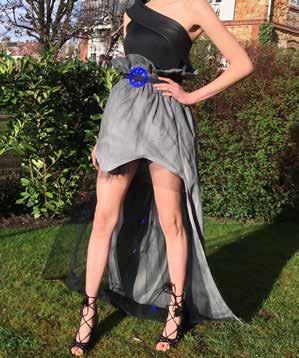
3 minute read
Design and Technology
AQA GCSE Design & Technology
Key Stage 4 Guide
Why GCSE Design & Technology?
With the fast-changing world of virtual modelling and 3D printing in which products are designed and manufactured, this is an exciting time to study GCSE Design and Technology. The qualification will prepare students to participate confidently and successfully in this increasingly technological world. Students will gain awareness and learn from wider influences on Design and Technology including historical, social, cultural, environmental and economic factors. Students will get the opportunity to work creatively when designing and making and apply technical and practical expertise. The GCSE allows students to study core technical and designing and making principles, including a broad range of design processes, materials techniques and equipment. It allows them to contextualise and put into practice many of the theories they learn in Mathematics and Science, and they will also have the opportunity to study specialist technical principles in greater depth.
What does this course involve?
Within this course, students will continue to cultivate the skills developed across the full range of their KS3 Design & Technology experiences. They will be encouraged to design and make products with creativity and originality. Pupils will be challenged to design and make products using a wide range of materials; with the option to choose which materials and processes dependent on their own personal strengths and interests. On top of graphic communication and traditional hand-skills, pupils will also be given the opportunity to design using modern technologies, often in line with those utilised within professional design practices; virtual 3D modelling along with laser-cutting and 3D printing are all examples of skills that the product design course develops. Pupils will learn about materials, processes and design technologies. The skills developed include: • Graphic communication. • CAD/CAM. • Theory of design. • Engineering and manufacture. • Material and process theory. • Links to Mathematics and Science.
How am I assessed?
The course involves the completion of two units, both of which are assessed in very different ways; a coursework element and a written examination. Both elements comprise 50% of the overall final grade. The coursework element is completed in class, starting in June of year 10, with pupils getting to choose their own personal brief from three contexts distributed by AQA. This allows them to pick projects that appeals to them; effectively personalising the course. Generally, pupils complete coursework projects with a Product Design focus where they choose and design a product

AQA GCSE Design & Technology (Continued)
to solve a particular identified problem. However, we also have extensive Fashion & Textiles facilities in the department and have many pupils choosing a project within this area.
What makes a good product designer?
Everyone has the capacity for innovation. Those who will be most successful within this course will be: • Problem finders. • Problem solvers. • Risk takers. • Independent learners. • Team workers. • Divergent thinkers.
Future possibilities
The course involves the development of many transferrable skills; divergent thinking, problemsolving and self-directed learning to mention a few. This means that the course would supplement any individual’s further learning. However, there are some career paths that would particularly benefit from the skills that pupils will develop through completing a course in product design. These include: • Architecture (Building, Interior, Landscape). • Engineering (Civil, Mechanical, Electrical). • Product Design (Product, Transport, Carpentry, etc...). • Graphic Design (Advertising, Branding, Web Design). • Animation (Film, Illustration, Video Game). • Fashion Design (Clothing, Footwear, Jewellery). • Creative-Industry Professionals. The GCSE grade will be awarded with a 50/50 split, as below:

COURSEWORK:
• 50% of total grade. • Extended Design & Manufacture project. • Internally assessed.
EXAMINATION THEORY:
• 50% of total grade. • Examination at the end of year 11 based upon: oCore technical principles. oSpecialist technical principles. oDesigning and making principles.












